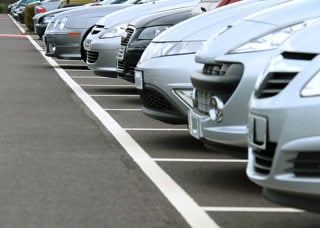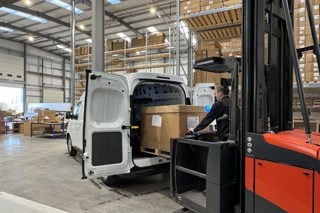Salary sacrifice specialist Tusker welcomed the Chancellor’s decision to increase company car tax for EVs by one percentage point year-on-year for three years from 2025.
In offering stability and clarity around benefit-in-kind (BIK) tax, Tusker says it will allow the industry to continue to help all drivers to access new, safe and environmentally friendly cars in a cost-effective manner.
Paul Gilshan, CEO at Tusker, said: “Our industry has worked closely with Government departments, and it has been great to hear that the Chancellor said that they have listened and now confirmed the current low benefit-in-kind tax until 2025 with a rise of 1% annually thereafter until 2028.
“We applaud the Chancellor’s decision to offer motorists a clarity on the position of the Government on supporting EV drivers.”
He added: “Our data shows that the total cost of ownership for EVs is notably lower than that of petrol and diesel vehicles, meaning that motorists struggling with the current cost rises continue to be offered a clear advantage in driving a zero-emission vehicle.”
Fleet Alliance says that as a result of the new BIK rates, salary sacrifice is set to remain the choice for thousands of employees wishing to move to electric cars.
Fleet Alliance is currently campaigning to democratise the electric car through its employee electric car salary sacrifice scheme, using the hashtag #ElectricCarsAreForEveryone.
Andy Bruce, CEO of Fleet Alliance, said: “The announcement by the Chancellor to keep BIK rates benign on EVs will ensure we can continue to encourage as many drivers as possible to switch to zero emission motoring, whether they are company car drivers or employees benefiting from a progressive electric car salary sacrifice scheme.”
Bruce said that drivers choosing a salary sacrifice scheme could drive an electric vehicle at a far more accessible rate than if they were to lease the same car privately, thanks to tax and National Insurance reductions.
While there is still BIK to pay on the vehicle, he added, it remained at a significantly low rate to encourage the uptake of electric cars.
“I think this gives the fleet sector the reassurance that the Government continues to support the green agenda and ensures we can continue working with employers who wish to drive their ESG agenda forward,” added Bruce.
“With salary sacrifice they can do that by offering electric cars to all their employees who don’t qualify for an electric company car.”
Caroline Sandall-Mansergh, consultancy and channels development manager at Alphabet GB, says that, while it is disappointing that EVs will no longer be exempt from VED after April 2025, she was also pleased to see that the increase in company car tax for EVs will be incremental at 1% per year.
“From the BIK increase announced, the average electric vehicle driver on a £35,000 list price at the 20% tax rate will only be paying an extra £6 a month from April 2025,” she said.
“However, such a sharp increase in VED for EVs is likely to limit uptake, particularly in light of current energy prices.
“We would have preferred to see the introduction of a new lower rate in order to continue to differentiate zero emissions vehicles from other vehicles.”
She continued: “As the Government has confirmed its commitment to meeting 2030 net-zero targets, it is crucial that the UK’s transition to EVs continues at pace.
“The sales figures industry wide over the last year have shown a positive start towards the rate of adoption required; at Alphabet GB alone our new car order figures year-to-date for PHEVs are neck and neck with petrol vehicles, and pure electric orders have increased by 19% compared to the same point in 2021.
“To support this, we welcome the extension of the 100% First Year Allowance for electric vehicle charge points to be announced in the Spring Finance Bill 2023.”
Jon Lawes, managing director of Novuna Vehicle Solutions, believes that the decision to subject EVs to VED for the first time is a “setback” to the electric vehicle industry.
"The announcement that electric vehicles will be subject to VED from 2025 has delivered a potential £165 million blow to the drivers of the one million EVs currently on UK roads,” he said.
“Drivers should not be penalised for choosing a more environmentally friendly mode of transportation, and the Chancellor’s decision appears completely at odds with the Government’s 2030 ambitions.
"However, belated clarification that benefit-in-kind rates will remain at a relatively low level beyond 2025 is a welcome announcement and provides much needed assurance for corporate fleets.
“It’s imperative we remove barriers to adoption, but with no new commitments to charging infrastructure announced today, the Government must urgently do more to deliver on one of its key growth priorities.”
David Bushnell, director of consultancy and strategy at Fleet Operations, said: “The Chancellor had tough decisions to make as he set about finding the public spending cuts and tax rises needed to fill the UK’s fiscal black hole.
“For the transport sector, the government’s balancing act of increasing tax revenues with its continued commitment to meeting net zero targets was always going to prove contentious.
“His Autumn Statement, however, has at least given fleet businesses and drivers clarity, along with breathing space, to plan ahead and factor tax rises for electric vehicles (EVs) into their financial forecasts and budgeting from 2025.
“It was always going to be a case of when, and not if, EVs would become subject to vehicle excise duty and the year-on-year 1% increase in company car tax, for the three years from 2025, was lower than many industry analysts were expecting. Thankfully, a significant tax benefit remains for those transitioning to EVs.
“Moreover, a notable call to action to order vehicles before 2025 has also come in the shape of the Expensive Car Supplement being applied to EVs for cars listed over £40,000.”
Nick Caller, managing director of Holman, said: "The company car sector, which has been dogged by Governmental indecision and a lack of clarity on future policy, can look forward with optimism.
"The Government’s forecast of its policy for EVs shows a £95 million uplift in benefit-in-kind tax revenue in 2025, and reaching £245 million by 2028.
"Bearing in mind the incremental percentage rise in tax for EVs, that is a considerable increase, showing it expects there to be a boom in the market.
"Now it is up to the OEMs to find a way to get enough supply into the market to support this.”
Business group Logistics UK said it was encouraged that the Government has prioritised stability for the economy after a period of volatility, which will help restore confidence for businesses.
However, as Kate Jennings, the organisation’s policy director explains, there is also disappointment that some of the measures announced could stifle the switch to greener energy.
“The Government’s announcement of continued infrastructure investment for Northern Powerhouse Rail, the HS2 extension to Manchester and the East West Rail link is good news for logistics businesses looking to strengthen cross-country connections with their customers,” she said.
“However, the removal of vehicle excise duty relief on vans is an unhelpful signal for millions of businesses at a time when they are being encouraged to move away from diesel.
“Most logistics operators work on very narrow margins, with vehicle acquisition schedules planned way in advance to minimise disruption to cash flow.
“At a time when operators are already facing increased operating costs, the additional tax imposition will create an additional burden: our sector needs more incentives to make the switch to alternative fuels, rather than barriers on the road to net zero.”
Mike Hawes, chief executive at the Society of Motor Manufacturers and Traders (SMMT), said that the industry recognised that all vehicle owners should pay their fair share of tax, however, the move on VED would mean mean electric car and van buyers – and current owners - will face a significant uplift in tax.
“The sting in the tail is the VED supplement which will unduly penalise these new, more expensive vehicle technologies,” he said.
“The introduction of taxes should support road transport decarbonisation, and the delivery of net zero, rather than threaten both the new and second-hand EV markets.
“With a ZEV mandate on the way for car and van manufacturers, we need a framework that encourages consumers and businesses to buy electric vehicles.
“We look forward to working with government on how to transition the market and ensure the tax framework on road users supports this objective.”
Philip Nothard, insight and strategy director at Cox Automotive, said: “Scrapping the tax exemption on electric vehicles raises their cost of ownership, which has been on the rise due to the ongoing energy crisis and semiconductor shortages.
“The concern is that this will hinder the industry’s recovery efforts as it returns from the impact of the pandemic, Brexit and spiralling energy costs.
“The exemption also risks further dampening already weak consumer spending and confidence, providing another obstacle to growth in the transition to electrification.
“While we recognise that the exemption would eventually be lifted, we question the timing of the announcement. It comes as a major blow for the van market in particular, which is at a much earlier stage on its journey towards electrification, yet now faces yet another unwelcome hurdle to navigate.”
Edmund King, AA president, shared Nothard’s concerns. He said: “Whilst we understand that EVs will need to be taxed, we stress that the road to electrification must not be stalled by excessive taxation.
“There is no doubt the introduction of vehicle excise duty on EVs and making EV company cars less attractive by increasing tax rates, will slow the road to electrification.
“This may delay the environmental benefits and stall the introduction of EVs onto the second-hand car market.
“Unfortunately the Chancellor’s EV taxation actions will dim the incentive to switch to electric vehicles.”
AA research has already shown that the surging electricity prices are a factor in deterring or delaying over 70% of drivers from going electric. Hence the importance of tax incentives is greater than ever.
However, Seb Goldin, CEO of Red Corporate Driver Training, said that the announcement VED will apply to electric cars and vans from 2025 is to be “applauded.
“When it comes to investment in infrastructure, everybody should pay their fair share, no matter what powers their vehicle,” he said.
“But with this comes responsibility for the Government to invest that extra revenue - forecast to be up to £1.5 billion more by 2028 - back into our roads.
“Recent research by the DfT showed that nearly a third of UK roads are classified either red or amber in terms of condition and we need to see that improve, because poorly maintained roads have a direct impact on safety, efficiency and costs.”
James Maden, sales and marketing director at Nexus Vehicle Rental, did not agree with Goldin, however. labelling the move “concerning for the fleet industry”, but perhaps not unexpected.
“While we agree that electric car owners should contribute to the upkeep of our roads, there is still more that needs to be done to ensure the UK has suitable infrastructure in place for businesses that switch to electric ahead of the ban on new petrol and diesel vehicles in 2030,” he said.
“It is positive that the Government is still signposting for a greener future, but it appears somewhat contradictory for the Chancellor to reiterate the Glasgow Pact commitment to cutting emissions by 2030 while simultaneously imposing taxes that may discourage businesses from upgrading their fleets to electric.
“Following this news and the Chancellor’s announcement that there would be no cuts to capital investment over the next two years, it is time that the Government finally comes through with its promises to improve our roads and expand access to EV charging points across the UK.”
Ashley Tate, CEO of Mina, believes overall the Autumn Statement was positive and showed the Government is still very supportive of EV adoption.
“New EV models are hitting the market in the hundreds over the next two to three years and we’re seeing the purchase prices drop significantly, meaning the overall picture for EV looks far more attractive,” he said.
“As EVs become the norm, it’s only fair that EV drivers pay their fair share of tax and I think the Government is taking sensible steps towards that.”
Melanie Shufflebotham, chief operating officer and co-founder, Zap-Map, added: “EV drivers will still save with lower costs to run and maintain their vehicles and receive tax benefits on company cars. Not to mention the vital carbon saving and clean air benefits.
“As the used market grows and prices for new vehicles drop, the value of switching to electric will be apparent to all drivers, whether they are paying road tax or not.”
Peter Golding, managing director of FleetCheck, believes that the Autumn Statement signalled a new period of austerity similar to that seen after the global financial crash and businesses across the country will be looking to their cost base in order to identify areas where savings can be made.
“Car, van and truck fleets will be very much part of this process and, for us, it is clear that the story of 2023 for this sector is very much going to be about trying to reduce costs and extract more value from money that is being spent,” he said.
“The difficulty is that this will occur at the same time as major strategic shifts in fleet management are occurring, notably electrification, and juggling these priorities will be extremely demanding.
“We believe that meeting all of these objectives is certainly possible but it’s not going to be easy and will potentially place a great deal of pressure on managers, drivers, suppliers, processes and technology.”
Chris Knight, UK automotive partner at KPMG, says that the automotive sector will be hopeful that the overall measures announced by the Chancellor will help to stabilise the UK economy and lower some of the inflationary costs that they have faced in recent times.
“It’s vital that the UK is viewed as being a good place for inward investment - and the global race to be a world leader in electric vehicle production at scale is well underway,” he said.
“To ensure that the UK retains a position of automotive strength in the medium term, both industry and government need to ensure an ecosystem that includes gigafactories and investment in battery technology development, as well as related skills provision.
“Electric vehicle development, production and sales have all been a significant positive during a time of unprecedented challenge for the UK automotive sector.
“Whilst not until 2025, the sector will be hoping that introduction of taxes on electric vehicles does not slow the pace of transition – which is already threatened by rising energy prices and a weakening of consumer spending power.
“The UK automotive sector will be nervously awaiting the outcome of the Government’s review into energy price support for businesses beyond the end of March.
“Exposure to rising energy prices during 2023 would further threaten the global competitiveness of the UK automotive industry and hinder its ability to invest in innovation, research and development.”























Login to comment
Comments
No comments have been made yet.